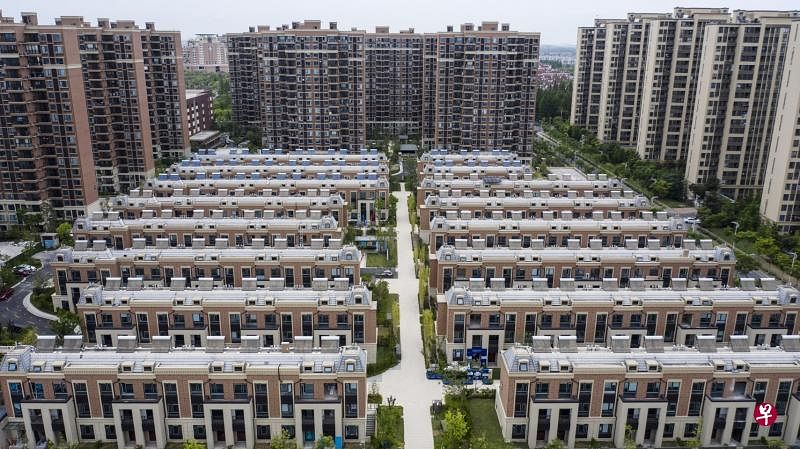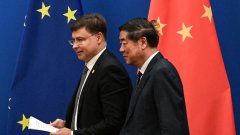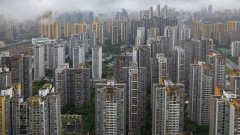
Since the beginning of this year, it has stabilized the economy for "rescue the market", and China has launched various measures to loosen the real estate policy, but the market has resumed slowly.Insiders believe that after the regulation of the property market has been relaxed, the expected effect is still not seen, and the biggest problem is that the social confidence is insufficient.
Two months ago, after China ’s many places in China successively issued the stabilization of the property market, Su Liming (a pseudonym) in Guangzhou’ s citizen decided to sell a property invested in Shundelon, Guangdong.
Su Liming purchased this house in 2017. At that time, it was when the regulation and supervision of China's property market continued to increase. According to the policy, he had two houses in Guangzhou and could not buy a third house locally.
Su Liming, who intends to invest in the property market, has shifted his attention to the Shundelen religion with no purchase restriction policy, with more than 2.46 million yuan (RMB, the same below, S $ 510,000), and purchased a set of 137 square meters of houses.
Five years later, the house in Su Liming's hands has not been resold, and these five years have happened to be an important period of China's real estate experience.
Under the total tone of "housing and not stir -fry", China's house prices will no longer rise all the way, the pressure of buildings in third- and fourth -tier cities has increased, and the transactions of the property market under the epidemic are continued to downturn, and the weak economic weakness has also led to poor purchasing power.
In the first half of the first half of the real estate sector
The latest data released by the National Bureau of Statistics of China on Friday (July 15) shows that China's real estate field has suffered heavy losses in the first half of the year, real estate development investment decreased by 5.4 % year -on -year, the sales area of commercial housing in the country fell by 22.2 %, and the sales of commercial housing decreased by 28.9 %; The prices of 70 large and medium -sized cities fell for 10 consecutive months, and house prices in June fell 0.1 % from May.
The real estate market is sluggish, and the "bad tail" situation of pre -sale real estate has increased. Recently, buyers in many places in China have also rejected the risk of affecting personal credit and refused to pay the "bad tail building" mortgage.
According to a report from Citibank, due to the long -term suspension of real estate projects and a decline in housing prices under the crown disease epidemic, as of July 12, 35 real estate projects in 22 cities in China had a collective refusal to pay loans.
Su Liming said in an interview that according to the suggestion of real estate agencies, the house in his hands is now worth about 2.2 million yuan, which is more than 200,000 yuan less than his starting price at that time.
Su Liming, who has not earned up to invest in real estate, has tasted the "sweetness" of buying a house.He insisted on the purchase price of contract purchase. However, after two months, although the floor was in good turn, Su Liming's house was lacking in asking, and the intermediary repeatedly suggested that he reduce psychological expectations and reduce the sale price.
Since the beginning of this year, many central ministries and commissions have stabilized the property market, and policies have been loosened in various places.However, the new policy is good, but the enthusiasm of the property market seems to have not seen heating.
Miss Liang, who is engaged in a real estate consultant in a intermediary company in Foshan, Guangdong, bluntly stated that recently the property market has made people "difficult to understand" -the seemingly warming up, but there seems to be no, the transaction volume has been rebounded, but property prices have been recovered, but property prices haveContinue to decline.
In fact, with the multi -underground mortgage interest rate, the monthly pressure pressure on buyers has decreased significantly.
Miss Liang said that it is currently a suitable time for those who just need to buy, but the market is cautious. If it is not a particularly low price, buyers basically wait and see.Several second -hand houses she have recently played in her company have actually lower the actual transaction price than earlier this year.
Ms. Wu, who has been engaged in a real estate consultant in Panyu District, Guangzhou for more than ten years, has the same feeling for the market.
The area where Miss Wu is located is known as the "Satellite City" of Guangzhou. A large number of young people have just needed a house to buy a home.In her opinion, the property market returned earlier, and the transaction volume did not go up.
Miss Wu believes that the biggest problem in the real estate market is currently insufficient social confidence.
She told the United Morning Post that in the current economic environment, buyers are extremely cautious and rational about liabilities. The first -hand real estate and high -quality housing of some price reductions may be more popular, but the second -hand houses that reflect the supply and demand relationship. Overall,The sales situation is not ideal. In her area, more young people can postpone the property plan.
It has been emphasized that "housing does not stir -fry" still requires time to stimulate the property market
The Central Economic Work Conference held at the end of 2016 proposed that "the house is used for living, not for frying"; the next year, the positioning of "housing does not fry" was written into the report of the 19th National Congress of the Communist Party of China.
Over the years, real estate -related departments have successively introduced policies involving housing enterprises financing, credit buyers' credit, and price restrictions.Including purchase restrictions, loans, sales, price limit, and "five limits" policies for restrictions, the "three red lines" of key real estate financing, and the upper limit of the concentration of real estate loans in financial institutions, all have a profound impact on the real estate industry.
Miss Wu, an intermediary consultant, 2018 is the peak of housing prices in China, and then gradually moved towards a trough.She pointed out that "housing does not speculate" set the main tone, that is, cracking down on speculative demand, suppressing excessive rise in house prices, and returning to the living attributes of housing.
"Housing and Living State" became the "tight curse" of the Chinese property market. Before that, the real estate industry, which has been singing high, faces a new challenge.
Under the influence of multiple factors such as regulatory policies and crown disease epidemics, the sales of real estate industry have fallen sharply in recent years. The former China's first real estate Enterprise Evergrande Group "exploded" due to the break of the capital chain, and other real estate companies also faced all other real estate companies.Defense and financing problems.
In the first half of this year, big cities such as Shanghai and Beijing successively caught in a sealed city or half of the city due to the Omikon epidemic, which brought a huge impact on economic development.The Chinese government takes stability of the economy and employment as an important task for development, and the importance of "stable real estate" is self -evident.
In order to save the market and stabilize the economy, local governments have introduced new measures to regulate the releasing real estate, and "creative" and "tricks" come out.This includes buying a house and sending a house, the implementation of "house tickets", and one person to buy a house.
According to data from the Central Plains Real Estate Research Institute, in the first half of this year, there were more than 460 real estate easing policies in various places. In May and June, more than 100 cities issued a stable property market policy.
Under the stimulus of the New Deal, individual cities and some hot real estate began to warm up.However, the property market in third- and fourth -tier cities and non -hot -point second -tier cities is still at a low valley.
Huang Tao, general manager of Guangdong Central Plains Real Estate Project Department, analyzed in an interview with Lianhe Morning Post that the adjustment of real estate regulation and control policies in this round, and the city's policy is still the main tone, that is, different cities have different relaxation policies.
He pointed out that in some non -hot -point cities, real estate recovery is particularly difficult. In some areas, all regions have basically been regulated, but they have not achieved the expected results.Knowing, I believe that real estate is not very investment attributes.
Policy adjustment in first -tier cities and hot second -tier cities is still cautious
Zhang Xiaoduan, deputy dean of Dede Liangxing Research Institute, said in an interview that on the surface, the current adjustment status of the market is closely related to the regulation of the property market in recent years, including restrictions on purchase and loanIt is the "three red lines" of housing companies, the "three red lines" of housing companies, and financing policies, but in fact, the current market pressure is also subject to the impact of macroeconomic trends on demand.
She said that the people's expectations for future economic development and family income have changed, which affects market confidence from demand.
Zhang Xiaoduan also said that when the market is in a relatively active state, the supply will stimulate demand to release, but if the supply is affected, the market activity will be greatly reduced.Drag the project development process to a certain extent, all of which have affected market supply.
She pointed out that since the beginning of this year, the adjustment of the property market policies in various places is conducive to alleviating market pressure. However, from the perspective of specific measures for regulation, in first -tier cities and hot second -tier cities, policy adjustments are still cautious and restrained.This is also one of the reasons why there are many "loosening" policies but not much changes in the market; after the active market stabilizes and recovers, it can drive the recovery of the overall market.
The official is still very restrained when the policy of loosening hot cities. This shows that the government has repeatedly emphasized the positioning of "housing does not fry". The official does not want to see the market quickly rebounded after seeing the adjustment policy.
Zhang Xiaoduan said that from this perspective, there are actually some ways and tools in the official hands, but you need to consider and control carefully. While maintaining the early regulation effect, it is necessary to steadily restore market activity to avoid re -heat situation.
The adjustment of real estate regulation and control policies in this round, the policy is still the main tone, that is, different cities have different relaxation policies.
In some non -hot -point cities, real estate recovery is particularly difficult. In some areas, all regions have basically been regulated, but they have not achieved the expected effect.Real estate is no longer a investment attribute.
—— Huang Tao, general manager of Guangdong Central Plains Real Estate Project Department
The property market is shuffled and is expected to return to rationality
The industry's recovery has not been expected, and China's real estate industry is still in a deep adjustment period.People in the industry believe that after this round of pain and reshuffle, the real estate industry is expected to return to rationality.
Huang Tao, general manager of Guangdong Central Plains Real Estate Project Division, pointed out that in the past two or three decades, real estate has drove China's economic development and has contributed greatly to GDP growth. In the past 10 years, the government is trying to reverse this logic to promote the benign of the industry to promote the benign of the industryThe cycle, because only the national economy has developed steadily, can real estate develop good development.
Huang Tao believes that this round of regulation will be an iconic incident in the real estate industry in China. The process will inevitably have pain, and there will be a deep -water zone of reform. However, after the reshuffle is completed, the industry will return to the development of health and rationality.
Zhang Xiaoduan, deputy dean of the Dede Liangxing Research Institute, pointed out that on the one hand, the market did have a situation of continuous overheating and rapid rising house prices in the early stage.On the other hand, when the market is in a trough, it is a good time to promote the construction of a long -term mechanism. It will slowly withdraw some too rigorous and over -administrative means, which will help the healthy development of the overall industry.
In Zhang Xiaoduan's view, the current supply and demand of China's real estate industry is relatively weak. To get out of the current adjustment state and restore market vitality, both ends of supply and demand must work.
She pointed out that in terms of policy, the state is supporting corporate projects and acquisitions. In the future, it will help market confidence to gradually recover and alleviate some issues of the supply side; in demand, market confidence depends to a large extent on the foreseeing future economy.Only by further clearing economic expectations can the people's confidence in home industry can be enhanced.
Zhang Xiaoduan said: "Real estate is the pillar industry of the national economy, and this status will not change." She believes that stabilizing the economy can stabilize market demand, and after stabilizing real estate can we support economic growth.
For the next trend of China's real estate industry, Huang Tao believes that although the current recovery trend is relatively slow, it may improve significantly in the fourth quarter of this year.The quantity is expected to increase, and the market has gradually recovered.
He believes that after the current round of real estate regulation, the Chinese property market will be further differentiated in the future. While the property market returns to the living attributes, some high -end and can highlight the quality of housing quality will still have room for appreciation, but this type of house is limited to small as smallThe scope, and the investment cost is very high, to a certain extent, it will be "the game of the rich."




